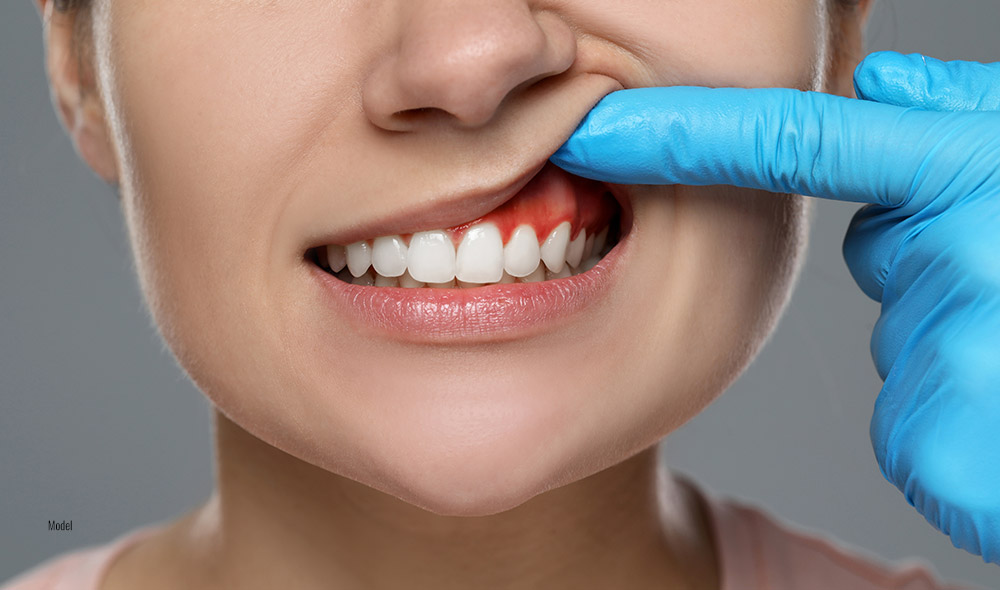Can Periodontal Disease Be Prevented?

Periodontal disease can compromise the gums and lead to tooth loss if it is not treated in time. This blog informs people about preventing periodontal disease by practicing good oral hygiene: brushing teeth twice a day, flossing, and attending biannual cleanings at the dentist.
3 Min Read:
Periodontal Disease
Everyone wants to have a smile that they are confident showing off. However, dental issues such as periodontal disease can create health and aesthetic problems that make people feel insecure about showing their teeth. In severe cases where periodontal disease progresses aggressively and causes teeth to fall out, people may not even be comfortable speaking in public.
Periodontal disease comes in various stages: gingivitis, early periodontitis, moderate periodontitis, and advanced periodontitis. The earlier it is caught and treated, the better. At the gingivitis stage, professional dental treatment can often be used to reverse its effects completely. However, more severe cases of periodontal disease will often necessitate gum surgery or other surgical treatments as a solution.
Taking good care of your teeth is essential for maintaining proper oral hygiene and preventing dental problems like periodontal disease.
What Causes Periodontal Disease?
Poor oral hygiene often causes periodontal disease. When the teeth are not brushed and flossed properly, plaque can develop—and if that plaque is left untreated, it can develop into periodontitis. Once periodontitis develops, the soft tissue around the teeth becomes compromised. Periodontal disease can lead to tooth loss and make you more susceptible to other health issues, such as heart and lung disease.
Other factors that may cause periodontal disease to develop include:
- Smoking or use of other tobacco products
- An unbalanced diet that lacks proper nutrients
- Teeth grinding
- Hormonal changes in the body
- Certain medications
How to Prevent Periodontal Disease
Keeping your teeth properly cleaned and regularly practicing good oral hygiene is the best way to prevent periodontal disease from developing.
Practicing Good Oral Hygiene
Nearly everyone knows that brushing your teeth is good for your oral health, but it can be less effective when the proper equipment and techniques are not used. Dentists recommend that you use a soft-bristled toothbrush and brush in gentle, little circles to clean the outer surfaces of the teeth. Brush vertically to clean the chewing surfaces of the front teeth. For the biting surfaces, use gentle brushing strokes and change the angle of the toothbrush as needed. Make sure that you don’t forget to brush near the gum tissue surrounding your teeth, angle the tooth 45 degrees towards the area the gums meet the teeth for best results and rinse your mouth after brushing to get rid of loose plaque and food remnants.
Many people often neglect to floss their teeth, yet this is an integral part of oral hygiene. Your toothbrush cannot reach in between your teeth, which is why flossing is necessary to remove plaque and other build-up between the teeth. You should floss your teeth at least once daily and rinse your mouth afterward.
Biannual Cleanings
Receiving biannual cleanings from a dentist is also essential for maintaining good oral health. You should see your dentist for a professional cleaning every six months. Some patients may need to get cleanings more often if they are at risk of gum disease and other dental issues.
Have More Questions About Periodontal Disease?
Take action to improve your oral health by visiting the dentist at least twice a year. If you are concerned about your gum health and think you may have periodontal disease, you can schedule a consultation with Dr. Salamati in Los Angeles, CA. Dr. Salamati can help you confirm if you have periodontal disease, what stage you’re at, and what treatment options will be most effective.
To schedule a consultation with Dr. Salamati, call our office at (310) 275-1090 or fill out our message form online.
